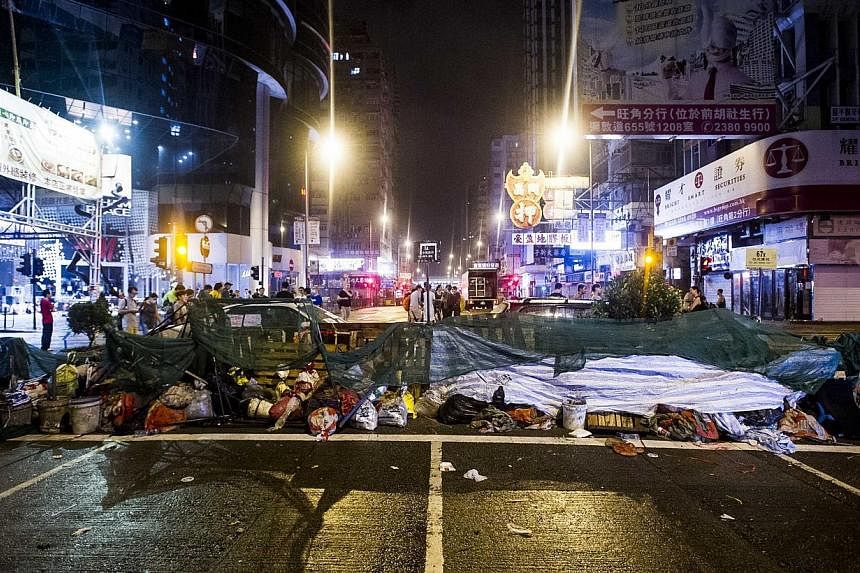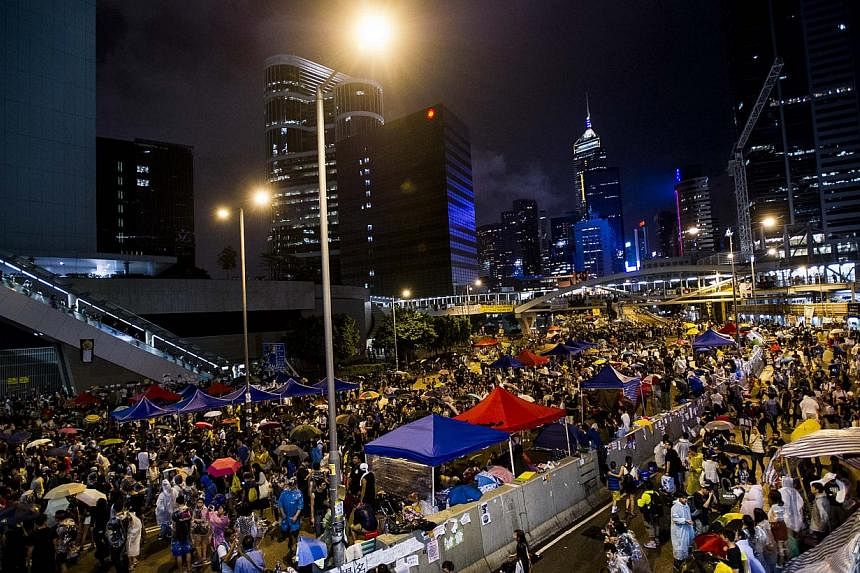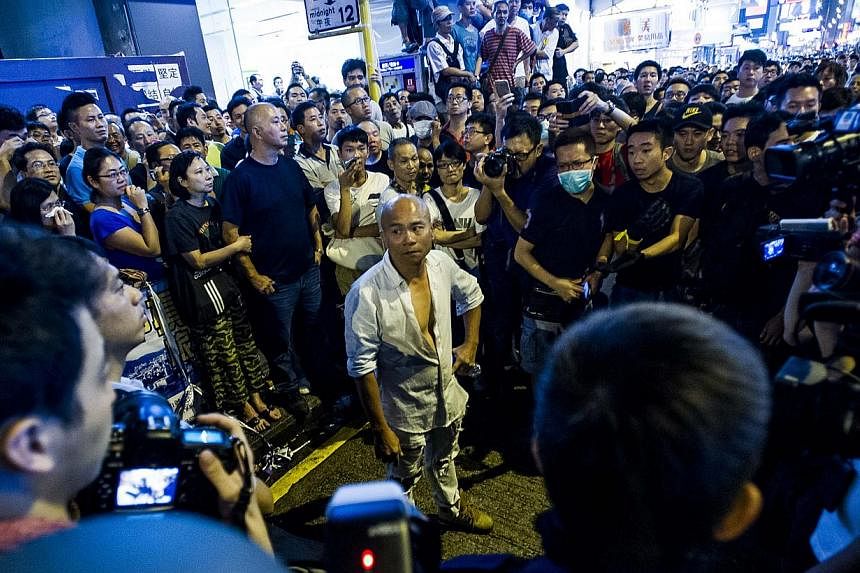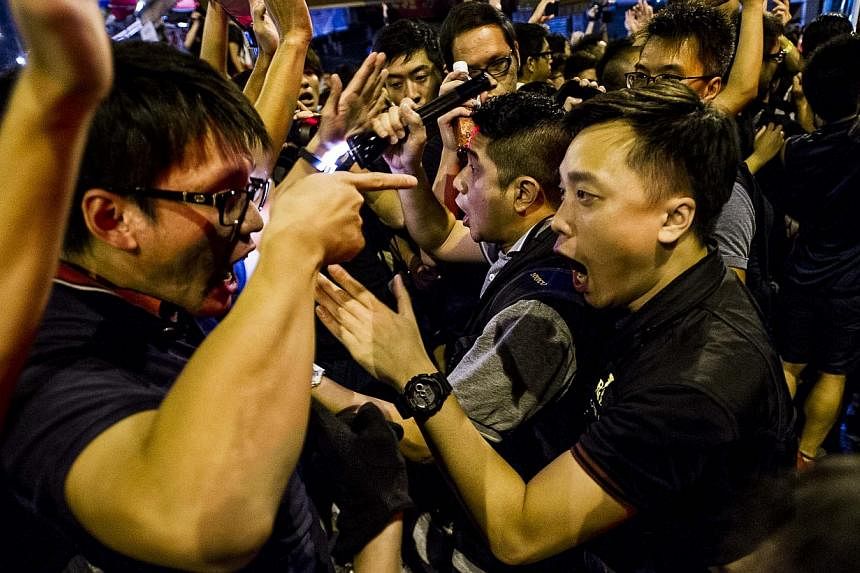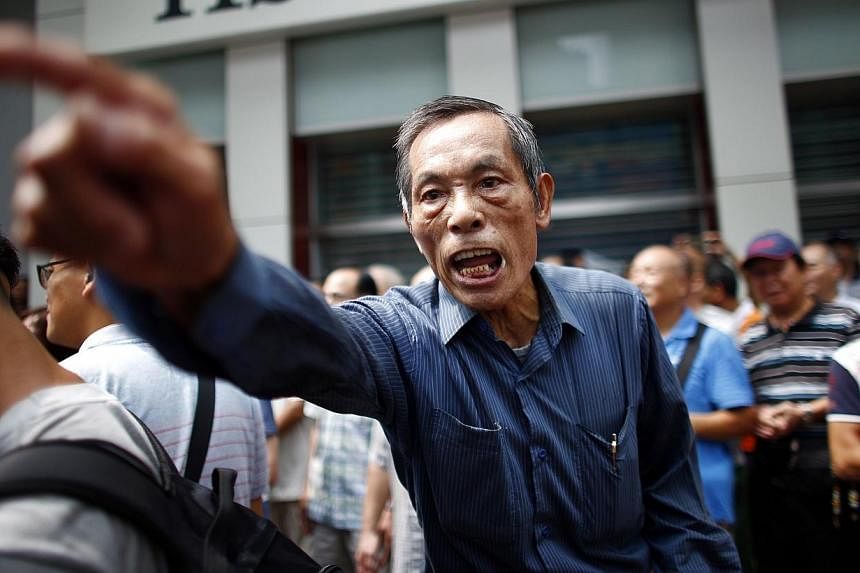HONG KONG chief executive Leung Chun Ying said on Saturday evening he was willing to do what it takes to resolve the week-long Occupy Central protests that have now drawn violence.
"The government and the police have the responsibility and determination to use whatever means necessary to return order to society," he said in a televised address.
He also said the most pressing matter, apart from maintaining the peace, was to clear up the access roads to the central government offices so that 3,000 civil servants could start now work on Monday. The area is now blockaded by protesters.
Distrust between Occupy Central protesters and authorities has once again spiralled up, with police accused of sitting on their hands while mobs attacked protesters.
This comes as proposed talks between the government and protest organisers are put on ice, meaning that there is no end in sight for the impasse - now one week long.
However, in a glimmer of hope on Saturday night, the Hong Kong Federation of Students (HKFS) said it was willing to talk if the government "shows goodwill" and pledges to investigate the Mongkok violence and the actions of the police.
"The government should show commitment in investigating the incident, investigate why the police were so lax in enforcement, accusations of helping criminals and to give an explanation to the public as soon as possible," the HKFS said.
Violent clashes broke out in Mongkok between pro-democracy protesters and opponents on Friday afternoon and night in rare scenes of sustained street fights that saw hundreds of people exchanging punches, kicking and stomping on one another, resulting in bloodied heads and other injuries. A smaller-scale wrangle broke out at Causeway Bay, the location of another protest site.
Police announced at 4.30am on Saturday that 19 had been arrested, eight of them suspected triad members. At least 18 people were injured, including six police officers.
Speaking to reporters later in the day, Secretary for Security Lai Tung Kwok said accusations that the police were abetting triads were "complete fabrication", adding that the police would remain impartial.
"We do not approve of any of this violence..police will faithfully and truthfully enforce law,'' he added.
The pro-democracy protesters have accused the government and the police of ignoring "organised attacks" by paid thugs sent to stir up trouble, with the aim of sabotaging and discrediting the protesters.
"The government has lost the trust of the people," said the Hong Kong Federation of Students (HKFS), the umbrella university union group that is one of the protest's organisers.
"The government and the police allowed triads and 'patriotic' (pro-Beijing) organisations to use violence on Occupy Central supporters, thus cutting off the option of negotiations. It has to bear the consequences."
Protest sites were tense on Saturday with fears of further attacks by opposition groups. Reports said fresh scuffles involving about a thousand people broke out mid-morning on Saturday in Mong Kok.
One group calling themselves the "Alliance in Support of the Police Force" gathered outside the police headquarters.
"Some officers have told me they haven't rested for 24 hours. If this continues, Hong Kong will not be able to handle it," said Joe Sin, one of the organisers of the event, which saw around 70 pro-police supporters gathered.
"We do not wish to have the PLA (Chinese military) come into the city to help. We just hope that Hong Kong citizens will support the police," he added.
Groups of people, mainly men, first descended on the protesters who had blockaded the busy intersection of Nathan Road and Argyle Road on Friday afternoon. They tore up the protesters' tent canopies, smashed up their supplies including water and masks, and removed the barricades.
It was not clear if they were local residents and shopkeepers, or were part of organised groups linked to external interests.
Mongkok, a popular shopping district, is also known for its triad links where organised criminal groups have business interests including running restaurants, nightclubs and mahjong parlours.
Triads in Hong Kong are also known to have pro-Beijing links, with the late Chinese patriarch Deng Xiaoping having called them patriots in the 1980s. He was under the triads' protection when he visited the United States in 1979, criminology academic Lo Tit Wing wrote in his 2010 article Beyond Social Capital.
As thousands of people massed in Mongkok on Friday following the initial attacks, more scuffles broke out between opposing groups.
The police appeared overwhelmed, with their cordons repeatedly being broken through. Protesters and their supporters lambasted the police for double standards, saying the police did little as compared to their use of pepper spray and tear gas on relatively peaceful protesters last Sunday night. Some followed the police's escorting of attackers to police stations only to find, they reported, the attackers released back on the streets soon after.
Rights group Amnesty International, which said it had first-hand witness accounts of women being sexually assaulted, also accused officers of "standing by and doing nothing" to protect protesters.
Police denied allegations that they did little to protect protesters from the violence. Senior Superintendent Kong Man Keung told reporters: "We tried our best... to protect lives down there."
In a televised message, Chief Executive Leung Chun Ying said on Friday night: "I urgently want to express to all citizens, no matter what attitude you have towards Occupy (Central), you still have to remain calm, and not use violence or disrupt order under any situation."
But there was widespread suspicion among the protesters that the thugs were sent to create disorder and discredit the Occupy Central movement in the eyes of the public.
The government is viewed as having a tacit strategy to wait out the protesters until fatigue and community backlash from economic and social costs force them to withdraw from the roads that they are occupying in Admiralty, Mongkok, Causeway Bay and Tsim Sha Tsui.
In an editorial on Saturday, the Chinese government's mouthpiece People's Daily warned that the protests would cause "severely disrupted social orders, huge economic losses and possible casualties".
The current state of affairs means that it is unclear when the next detente between government and protesters can be brokered. In its statement, the HKFS said that the proposed talks are being "suspended", but did not say that they are cancelled indefinitely.
The dialogue between the student group and an official delegation led by Chief Secretary Carrie Lam was announced minutes before a midnight deadline on Thursday for Mr Leung to resign or face the prospect of escalated protests.
With input from AFP and Reuters
